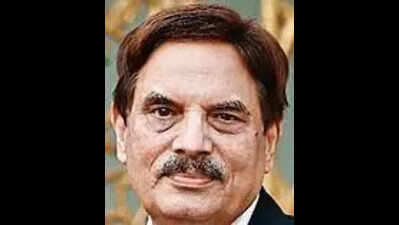A poet who epitomises SC’s order on ‘Urdu as tehzeeb’ | Mumbai News – The Times of India

It took the Supreme Court to expose a lie. Rejecting a plea by a former councillor of Patur town in Akola against the use of an Urdu signboard on the municipal council building, the top court succinctly pronounced: “Urdu is the finest specimen of Ganga-Jamuni Tehzeeb or the Hindustani Tehzeeb.” Perhaps, nobody in the city conforms more to the top court’s definition of Urdu than former IRS officer-poet Vinod Kumar Tripathi.
Tripathi, 68, whose pen name is ‘Bashar‘, embodies the language’s basic character. It is boundary and religion neutral. The former bureaucrat-poet recently received a new feather in his cap when legendary former Pakistani cricketer Zaheer Abbas brought a beautiful gift for him. It was a copy of an MPhil thesis that Pakistani scholar Nadeem Ilahi completed on Tripathi from Multan-based Bahauddin Zakariya University.
Titled “Vinod Kumar Tripathi: Adbi Khidmaat” (Vinod Kumar Tripathi: Literary Contributions), the research pays tribute to Tripathi’s dogged determination to know Urdu, especially its script, the craft of penning poetry, and his refusal to accept the obnoxious view that Urdu belongs to Muslims alone. “Since my second collection of Urdu poetry ‘Meri Zameen Ki Dhoop’ also got published in Pakistan, scholar Nadeem Ilahi decided to do an MPhil on me and my work. I am overwhelmed as it reaffirms my faith that poetry knows no boundaries,” says Tripathi, seated at the poolside coffee shop of a South Mumbai elite club.
Growing up in the multilingual, multicultural milieu of Allahabad (now Prayagraj), Tripathi honed his skills in poetry writing quite early. Initially using the pen name Tathagat, he edited the college magazine Campus, became a leftist, and briefly drifted to atheism before he mastered political science, taught it briefly at a college, and subsequently entered Civil Services. “Poets are sensitive by nature. They want to change situations, bring change by words. I too would get sad at the people’s sorrow and wanted to express my feelings through poetry,” he says.
Though he has three collections to his credit (two more are in the pipeline), it was his first collection ‘Meri Zameen Ke Log’ that became the reason for his learning the Urdu script. He brought this collection in Hindustani in Devnagri script. Posted in Mumbai as a senior Income Tax officer, he befriended many connoisseurs of poetry in the city. Growing up on Sahir Ludhinavi’s shairi and ghazal gaiki of the likes of Jagjit Singh, Mehdi Hassan, and Begum Akhtar, he found himself drawn to soirees featuring singers from India and Pakistan.
Once at a concert in Bandra, he met Pakistani singer Shafaqat Hussain and wanted to gift him a copy of his first book. “Mujhe Hindi nahin aati (I do not know Hindi),” said the singer, sending Tripathi into a tizzy. “That day, I realised I cannot do justice till I learn the Urdu script. I briefly hired a tutor, but soon began self-teaching. With the help of books, a dictionary, and an online course, I learnt its script,” says the poet, who gets invited to mushairas but refuses to take remunerations. “Poetry writing is not my source of income. I believe in the tradition that those poets who depend solely on writing and reciting poetry deserve the remunerations,” he says.
Did he ever face any criticism from family or friends for learning Urdu?
“On the contrary, many ask me how I learnt it. I remember one person on Facebook asking me why I write in Urdu and another suggesting I should not write in the language if I do not know it properly. I suitably answered them and nobody has asked me such stupid questions since,” he laughs.
While researcher Nadeem Ilahi admits that he found Tripathi’s poetry humanist and compassionate, he also quotes, for validation, testimonies of many eminent scholars, including General Secretary of Anjuman Taraqqi Urdu (Hind) Athar Farooqui.
“The humility Vinod Kumar Tripathi shows in his personality also punctuates his poetry. He learnt Urdu to do poetry in this language and worked very hard on prosody,” says Farooqui, who has closely read Tripathi’s poetry collections.
















